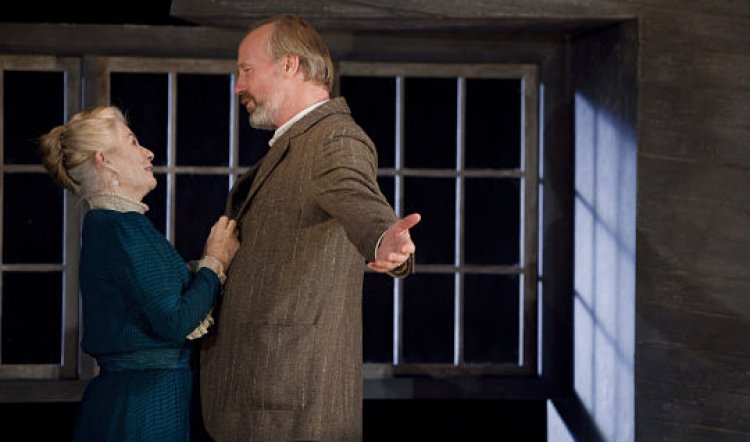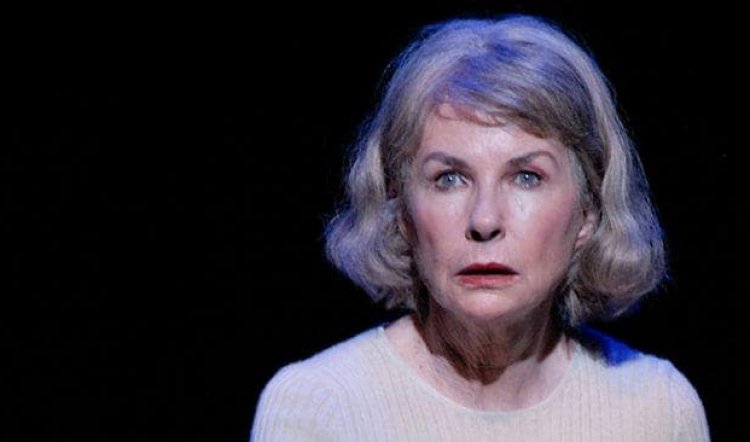
Long Day's Journey Into Night
LONG DAY’S JOURNEY INTO NIGHT Sydney Theatre at Walsh Bay, a Sydney Theatre Company, Artists Repertory Theatre & Commonwealth Bank production; 29 June-1 August; then 13-29 August, Portland Oregon. Photos by: Brett Boardman.
ROBYN NEVIN gives one of the great performances of her career in carrying on her slight shoulders this production of Eugene O’Neill’s fabled portrait of family disintegration. “Carrying”? Yes – on opening night at least the play’s Oscar-winning Hollywood movie star draw-card William Hurt seemed not only missing in action but also miscast and out of his depth.
Long Day’s Journey Into Night is O’Neill’s painfully autobiographical catharsis that has the Tyrone family – mother, father and two sons – standing in for his own. The play seeks to dissect the crippling effect on him/Edmund (Luke Mullins) of a self-obsessed, morphine-addicted mother (Nevin) and a self-obsessed, self-addicted father (Hurt). There's the added trauma of a long-dead infant sibling and a semi-living elder brother Jamie (Todd Van Voris), whose bluff, buffoon persona fails to protect either brother from the toxic Tyrone nightmare.
The play is one of the classics of 20th century American theatre and is approached rarely in this country and, at any time, with a justifiable mix of excitement and trepidation. The cast of characters – completed by Irish immigrant factotum Cathleen (Emily Russell) – is sparely symbolic of much that can be wrong with the nuclear family. The play itself is also sparely written (despite 3+ hours running time) and that means few hiding places for weak performances or ways to fudge muddled thinking by the director; and none are found by this production.
The play is deceptively simple: the family is gathered for the annual vacation during James Tyrone’s down-time from the touring life of a once-potentially great and now disappointed jobbing actor. The absence of the usual color and movement of their daily lives brings into sharp relief the chasms of dysfunction in each of the parents; and the consequent foundering of their children’s lives in a swamp of whiskey and recriminations.
They are at their summer house in Connecticut: all fog horns on Long Island Sound and mouldering trunks full of painful memories in the attic; but a possibly insurmountable hurdle for the audience (and for the actors too) is a monumental/brutalist/abstract set by Michael Scott Mitchell. It has the family rattling around in a cross between a WW2 bunker and a public toilet. If the intention was to eliminate the distractions of a New England clapboard and its attendant furnishings, it fails miserably; if the intent was something else – god knows.

The weirdly grim setting is somewhat offset by a rich soundscape by Max Lyandvert of non-representational but colorful washes of mood and suggestion as well as place-setting gulls and fog horns. Tess Schofield also brings comprehensible human warmth to the costumes. However, in sharp contrast to these accomplished and top-rank professionals, it seems that inexperienced director Andrew Upton is unable or unwilling to grapple with either the play or his Hollywood star. The former badly needs a firm and skilled hand to pull it together and push it forward; the latter’s oddly disconnected presence means the first half is an almost comical demonstration of Method movie acting (much muttering into the top buttons of his waistcoat); so he was inaudible to most despite being wired for sound.
The second half reveals that Hurt favors a minimal set of acting gestures and sticks to them: a bear-style bellow, a double flap of the arms and a stop-start delivery that is possibly supposed to be suffused with meaning. The real result is to spotlight the intelligence, range, breadth and depth of the woman playing opposite him. Robyn Nevin is a mesmerizing presence in this role – and quite different from her previous outing in it (with John Bell as a magnificent Tyrone). Her Mary Tyrone is a complete, three-dimensional and tragic human being; deluded, cruel, hopeful, pathetic and, in her final morphine-addled regression to childhood, an unforgettably sad figure.
The younger members of the cast do a fine job of their roles in trying circumstances; each seems to be making their own way in the world and that they pretty much end up in the same place at the same time is to their great credit. The night belongs to Robyn Nevin, however, and she’s well worth the ticket price (which is moderate anyway). Portland, Oregon is in for a fabulous surprise.



